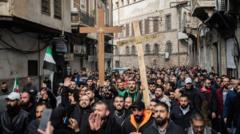Protests have erupted across Syria in response to the burning of a Christmas tree in the predominantly Christian town of Suqaylabiyah, prompting urgent calls for the new Islamist authorities to safeguard the country's religious and ethnic minorities. A viral video shared on social media depicted the tree ablaze in the main square, shocking the community just hours before Christmas Eve celebrations.
The Islamist faction Hayat Tahrir al-Sham (HTS), which has played a significant role in the uprising against former President Bashar al-Assad, announced the detention of foreign fighters allegedly linked to the incident. HTS leaders have expressed their commitment to upholding the rights of religious minorities, urging that such events must not undermine the social fabric of Syria.
Videos circulating online captured masked individuals pouring an unknown liquid on the Christmas tree. The intent of this act remains unclear, whether it was an attempt to extinguish the flames or fuel the fire. In the aftermath, a religious representative from HTS assured the gathering crowd that the tree would be restored before the morning, boldly displaying a cross in a rare show of solidarity with the Christian community.
Protests soon expanded to the capital Damascus, where demonstrators marched, voicing their frustrations against foreign involvement in the country. "Syria is free, non-Syrians should leave," chanted the crowds, demanding the expulsion of foreign fighters linked to the arson.
In another part of Damascus, protesters brandished crosses and Syrian flags, declaring, "we will sacrifice our souls for our cross." One demonstrator, identified as Georges, articulated a deep sense of unease, stating, "If we're not allowed to live our Christian faith in our country, as we used to, then we don't belong here anymore."
Syria is home to diverse ethnic and religious communities, including Kurds, Armenians, Assyrians, Druze, Alawite Shia, and a Sunni Arab majority. Following the recent overthrow of Bashar al-Assad, many displaced Syrians have begun returning home, with reports indicating that over 25,000 Syrians have re-entered the country in just the last days. However, it remains uncertain how HTS will manage the governance of Syria, which has transitioned from an extremist jihadist agenda to a more pragmatic approach.
HTS recently announced a restructuring strategy for the Ministry of Defence, aiming to consolidate various factions within it, although the details surrounding which groups would be included remain ambiguous. The group's previous designation as a terrorist organization by numerous international bodies, including the UN and US, is still a point of contention.
Despite the troubling incidents and ongoing protests, HTS has been engaging in international diplomacy, evidenced by the lifting of a significant bounty on its leader Ahmed al-Sharaa after recent meetings with US diplomats. As the military presence of US forces continues and operations against jihadist groups persist, the new leadership faces a critical challenge in ensuring security for minority groups and stabilizing the country amidst potential conflicts involving foreign extremists and regime supporters.




















